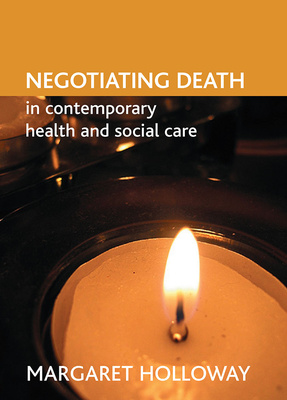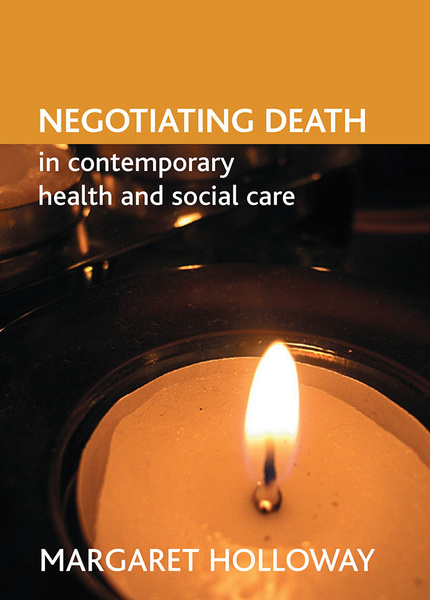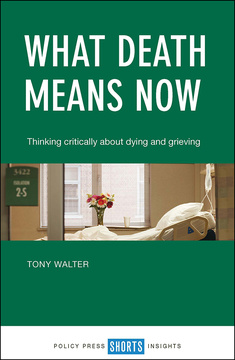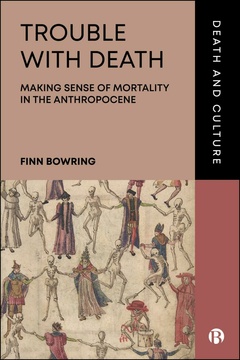Negotiating death in contemporary health and social care
By Margaret Holloway
Published
Oct 17, 2007Page count
224 pagesISBN
978-1861347220Dimensions
240 x 172 mmImprint
Policy PressPublished
Oct 23, 2007Page count
224 pagesISBN
978-1847420152Dimensions
240 x 172 mmImprint
Policy PressOnce regarded as taboo, it is now claimed that we are a death-obsessed society. The face of death in the 21st century, brought about by cultural and demographic change and advances in medical technology, presents health and social care practitioners with new challenges and dilemmas.
By focusing on predominant patterns of dying; global images of death; shifting boundaries between the public and the private; and cultural pluralism, the author looks at the way death is handled in contemporary society and the sensitive ethical and practical dilemmas facing nurses, social workers, doctors and chaplains. This book brings together perspectives from social science, health-care and pastoral theology to assist the reader in understanding and negotiating this 'new death'.
End-of-life care and old age, changing funeral and burial practices, new stigmas such as drug-related bereavements, are highlighted, and theories of dying and bereavement re-examined in their context. The concluding chapters incorporate recent case studies into an exploration of the meanings and shape of holistic and integrated care.
Students interested in death studies from a sociological and cultural viewpoint as well as health and social care practitioners, will benefit from its critical appraisal and application of the established knowledge base to contemporary practices and ethical debates.
"This is a major exploration of conversations about death and loss between the social sciences, helping professions, and recent religious and spirituality discourses. The insights from these areas are used to explore meanings of death in two increasingly uncertain worlds - professional practice and Late Modernity. A book of enduring value for both academics and practitioners." Allan Kellehear, Centre for Death & Society, University of Bath.
"This is a book that could be used individually or within health and social care teams for discussion, and is relevant to social workers and health care practitioners alike... it is refreshing to find a book prepared to bring the often taboo subject of death into the 21st century." Margaret Surrey, Professional Social Work, June 2008
"In this beautifully written book, Margaret Holloway.....has managed to produce a text that is academic, practical and sensitive. I highly recommend this book to nursing students and practitioners." Nursing Standard, Vol 22: 45, 2008.
"...the book provides a very useful overview for those wishing to develop a more integrated knowledge base for working with dying or bereaved people." Tony Walters, University of Bath
"This book is welcome and timely, given the demographic changes associated with an ageing population and the social, ethical and philosophical questions that arise." Mortality journal, 2009
'The combination of thorough research, wide ranging theoretical perspectives and detailed examples from practice throughout the life course result in a fascinating and rewarding book that should appeal not only to those involved in palliative care but to health and social care professionals and academics across relevant disciplines.' Sociology of Health and Illness
"This one, wonderful book is an extraordinary resource, offering a comprehensive summary of what we know and think about dying and bereavement. Moreover, it sensitively applies this as a way that practitioners will find both helpful and easy to access. This is an essential title for all who work with the dying and bereaved or who teach those who do." Kenneth J. Doka, Senior Consultant, The Hospice Foundation of America
Margaret Holloway is Professor of Social Work at the University of Hull.
Death in late modernity; Contemporary health and social care; Understanding death and dying; Understanding bereavement and grief; The ways in which people die; Dying in the twenty-first century; Dying and bereavement in old age; The aftermath of death; Integrating theories and practices












